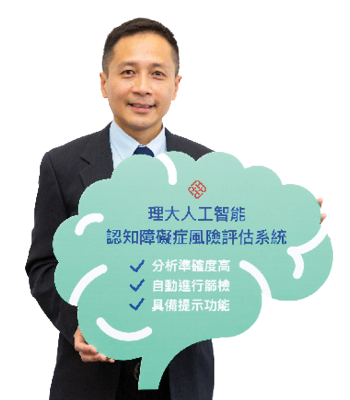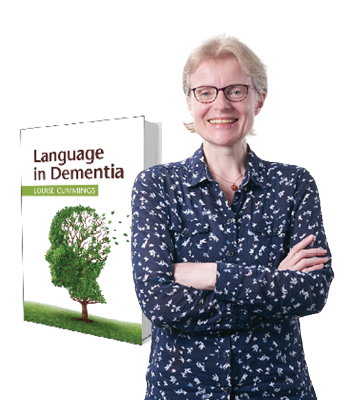Identifying warning signs of dementia
Other Articles
PolyU researchers use their expertise for the early detection of cognitive impairment
There is a new case of dementia in the world every three seconds and more than 50 million people worldwide were living with this condition in 2020. More worryingly, major studies have forecast further increases in dementia cases in the years ahead.
Unfortunately, there is currently no cure for dementia, an illness that affects every aspect of cognitive functioning, including memory, thinking, comprehension, learning, language and judgement. As a result, the early detection and diagnosis of dementia and timely intervention are the only hope for sufferers. However, the majority of people with early dementia go unnoticed, with approximately 75% not diagnosed with the condition, meaning they do not received any treatment.
Timely detection of dementia based on community health data
A Mini-Mental State Examination (MMSE) is commonly used to screen for cognitive impairment but repeated use of this method can lead to a practice effect, reducing its effectiveness.

Professor Choi and his research team have developed an assessment system to help healthcare professionals identify elderly people at a high-risk of developing dementia while at an asymptomatic stage, with a screening accuracy of nearly 90%.
To help overcome these limitations, Professor Thomas Choi Kup-sze, PolyU’s School of Nursing, is leading a research team to develop an assessment system that uses artificial intelligence (AI) to identify people who are at a high-risk of developing dementia while they are still at the asymptomatic stage. With a screening accuracy of nearly 90%, this tool flags up to healthcare professionals which patients may need follow-up investigations or a more detailed diagnosis. The project has secured HK$3 million funding from the Innovation and Technology Fund offered through the Government’s Innovation and Technology Commission.
In developing the system, the research team collected health data from more than 2,000 elderly people who received primary healthcare services in Hong Kong between 2008 to 2018. The dataset included demographic statistics, bio-measurements, such as body temperature, pulse rate, oxygen saturation, blood pressure and waist-hip ratio, as well as health assessment information on mobility, nutrition, depression, happiness and pain. Based on these data, researchers constructed an AI-assisted computation model to analyse the risk of dementia in community settings, such as elderly service centres. When healthcare workers input elderly people’s data into the model, it generates a cognition analysis to detect high-risk cases which require follow-up action.
“We will continue to develop the features and enhance the automation of the system in collaboration with community and business partners,” Professor Choi said. This promising tool for the early screening and detection of cognitive impairment among elderly people could help to reduce underdiagnosis and minimise delays in dementia treatment.
Language breakdown may signal the onset of dementia
Among the many symptoms of dementia, the loss of the ability to communicate is often most devastating for patients, leading to a deterioration in their quality of life. But the impact on language and communication are some of the least well understood aspects of dementia. Professor Louise Cummings, Associate Dean of PolyU’s Faculty of Humanities and Professor of the Department of English, has addressed this lack of understanding by examining language disruption in neurodegenerative disorders. She recently revealed her research findings in her new book Language in Dementia.

Professor Cummings’s book, Language in Dementia, contains useful resources, including patients’ language samples and exercises to develop language analysis skills, helping clinicians identify cognitive impairment markers.
In the study, Professor Cummings analysed different neurodegenerative disorders, including Parkinson’s disease and progressive supranuclear palsy. She recorded and examined the language of patients with these disorders. She also addressed the epidemiology, aetiology, pathophysiology, prognosis and clinical features, as well as the assessment and treatment of these disorders.
The research found that people with neurodegeneration have language difficulties in areas such as pragmatics and discourse. “I encourage clinicians to attach significance to subtle impairments in an individual’s conversation and narrative skills which may serve as markers of cognitive impairment. These impairments are quite unlike the structural language deficits – deficits in phonology (sound system), syntax (grammar) and semantics (meaning) – that are typical of stroke-induced aphasia,” Professor Cummings said.
Professor Cummings’ research contributes to the education of students in the field of speech and language therapy. Her book is also directed at other medical and health professionals involved in the management of clients with dementia, including clinical psychologists and neuropsychologists, geriatricians, neurologists, and psychiatrists. It is hoped that her research can help to reduce the burden of dementia care through enabling earlier diagnosis of the condition based on language impairments.






